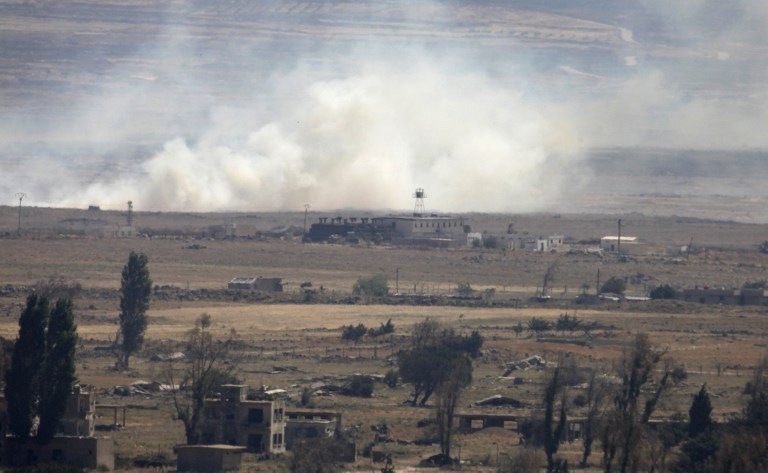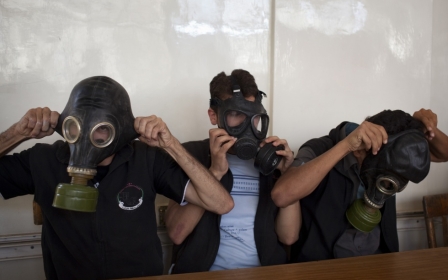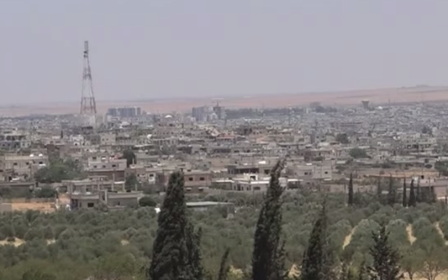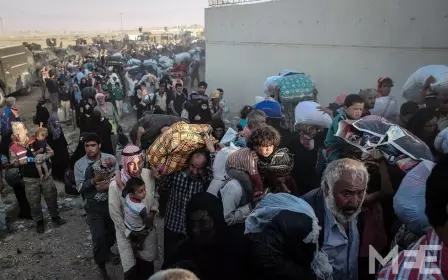Syria clashes between military and rebel groups on three fronts

Rebels surrounded a government-held Druze village on the Syrian side of the ceasefire line on the Golan Heights on Wednesday after heavy fighting, a monitoring group said.
The advance came a day after Israel, which has a significant Druze population, said it was preparing for the possibility that refugees fleeing fighting in the area might seek to cross to the Israeli-occupied side of the strategic plateau.
A missile siren sounded in Israel's Golan Heights just before an alliance of Syrian rebels launched an offensive against Syrian military bases in Quneitra province, just across the border, Israeli daily Haaretz reported.
The siren sounded when forces loyal to Syrian President Bashar al-Assad fired artillery toward military posts that have been taken over by rebels, about 1.5 km (0.9 mi) northeast of the Syrian village of Khadr.
Quneitra sits in a sensitive piece of territory around 70 kilometres southwest of the capital Damascus and has been the scene of frequent fighting between various insurgent groups and the Syrian military, backed by allied militia.
Rebel spokesperson Issam al-Rayes wrote on Twitter that insurgent groups fighting in the operation had signed a pact, which did not involve al-Qaeda's Syria wing, al-Nusra Front. The groups in the offensive are fighting under the banner of the rebel Free Syrian Army, he said.
After fierce clashes with pro-government forces, the rebels surrounded the village of Hader on Wednesday, the Syrian Observatory for Human Rights said.
"Hader is now totally surrounded by rebels, who just took a strategic hilltop north of the village," Observatory director, Rami Abdel Rahman told AFP.
The village lies along the ceasefire line with the Israeli-occupied Golan to the west, and by the border with Damascus province to the northeast.
He said the rebels had received reinforcements from elsewhere in Quneitra province, which covers much of the Golan.
"The regime has not sent reinforcements yet, but the Druze villagers are standing with the government," Abdel Rahman said.
Fighting around Hader, which began Tuesday, has left at least 10 rebels and 14 pro-government fighters dead so far, he added.
The encirclement of Hader comes amid rising fears in Syria's Druze community.
Last week, 20 Druze villagers were killed in an altercation with members of al-Nusra Front in Idlib province in the northwest.
Shortly after the deaths, rebel forces in southern Syria briefly overran a government air base in majority-Druze Sweida province, in their first such advance in the government-controlled region.
While the rebels were eventually expelled from the air base, fighting has continued nearby.
The Druze are followers of an offshoot of Shia Islam, and made up around three percent of Syria's pre-war population of 23 million.
The community has been somewhat divided during the war, with some members fighting on the government side and others expressing sympathy for the opposition.
Thousands of Druze men have evaded military service in the Syrian army's dwindling ranks and have mostly taken up arms only in defence of their own areas.
In Sweida, Druze have formed a local militia to protect themselves from the rebels, residents say.
On Tuesday, Israel's chief of staff, Lieutenant General Gadi Eisenkot said authorities were preparing for a possible influx of Syrian refugees.
A spokesperson confirmed he was referring to a potential influx from areas adjacent to the ceasefire line on the Golan.
His comments did not directly mention the Druze, but came after leading members of the minority in Israel called on the government to help their brethren in Syria following the recent violence.
Officials say there are 110,000 Druze in northern Israel, and another 20,000 in the Israeli-occupied Golan.
Israel seized 1,200 square kilometres (460 square miles) of the plateau in the Six-Day War of 1967 and later annexed it in a move never recognised by the international community.
'20 children killed in Deraa airstrike'
The fierce fighting near the border came hours after government airstrikes pounded the nearby Deraa province on Tuesday evening, killing at least 16 people, including 13 children, a monitoring group said.
Eastern Ghariyah, a small town just 10 kilometres north of Deraa city, bore the brunt of the attacks, the UK-based Syrian Observatory for Human Rights said.
However, Middle East Eye contributor Abo Bakr al-Hajj Ali, who is currently camped out with opposition forces outside of Deraa, said the casualty figures were higher. According to his sources, 23 people were killed including 20 children.
Those killed in Ghariyah were mostly children attending lessons on the Quran, locals told the Observatory. The Syrian government has not commented on reports of the attack.
A local resident who had fled the town told MEE: "When the children got out of the mosque, warplanes raided the town. The first raid [happened] near the mosque; a minute later a second raid [happened] next to the mosque, just as the children were leaving. The children come out of the mosque at the same time practically every day."
"I saw their remains and their blood scattered in the streets," added the resident, who did not want to be named.
The government airstrikes came just hours after the Southern Front alliance of rebel forces announced that it was gearing up to launch a major offensive to drive out the government troops still in control of the centre of the provincial capital, but who have been largely pushed out elsewhere in the southern province.
Hajj Ali is currently embedded with the Southern Front, an alliance of about 50 rebel groups that is considered one of the more moderate forces in the ever-polarising war, but that has fought alongside groups like Jaysh al-Islam and on occasion the al-Nusra Front.
Rockets over Damascus suburb
Meanwhile, the Syrian government has reportedly used so-called elephant rockets in an attack on the Damascus suburb of Douma, killing at least 36 people, including children, reported Al Jazeera.
The rockets, named after the distinctive noise they make when they are launched, are improvised weapons made by attaching rocket motors to much larger bombs - a process that increases their destructive power while greatly reducing accuracy.
On Wednesday, activists accused the government of using surface-to-surface missiles in Douma as clashes continued between opposition fighters and government forces.
In a video posted online of Tuesday's attack, residents were seen scrambling to rescue a brother and sister trapped after a building was destroyed.
There were shouts of joy as a girl was pulled alive from the rubble, while her brother could still be heard calling for help.
More than 60 people, including many children, were injured in the bombardment, activists said.
Syria's state-run SANA news agency said two shells struck Arnous Park in Damascus late on Tuesday as many people were out shopping ahead of the Muslim holy month of Ramadan, expected to begin on Thursday. It says the shells killed nine people and wounded 13.
The rebel stronghold of Douma has been under attack by forces loyal to Assad for the last three years.
Elephant rockets are part of an improvised arsenal used by government forces, who have already been condemned for using barrel bombs and chemical weapons on civilians.
US Secretary of State John Kerry has said it is possible that Syria's opposition groups may also have had access to chemical weapons "at one point in time or another", although he emphasised that rebel forces did not have access to aircraft or helicopters.
Although chlorine is not a prohibited substance, its use as a chemical weapon is prohibited under a 1977 Chemical Weapons Convention, which Syria joined in 2013.
Members of the Syrian Medical Society gave evidence to the US foreign affairs committee on Wednesday that shows Assad is using chlorine on civilians.
The latest developments come as the UN envoy to Syria, Staffan de Mistura, is in Damascus pushing for a political solution to end the conflict.
The UK-based Syrian Observatory for Human Rights, with a network of sources on the ground, says it has documented 230,000 deaths in Syria's war, almost 70,000 of them civilians.
New MEE newsletter: Jerusalem Dispatch
Sign up to get the latest insights and analysis on Israel-Palestine, alongside Turkey Unpacked and other MEE newsletters
Middle East Eye delivers independent and unrivalled coverage and analysis of the Middle East, North Africa and beyond. To learn more about republishing this content and the associated fees, please fill out this form. More about MEE can be found here.




